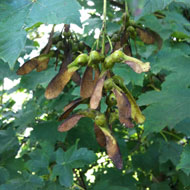
RVC hopes to improve understanding of the condition
Testing for atypical myopathy is now being offered by the RVC as part of its work to develop improved treatments and management of the disorder.
Atypical myopathy is a life-threatening equine muscle disorder caused by the ingestion of sycamore tree seeds or seedlings, which contain the toxin hypoglycin-A.
The risk factors for horses are unclear. For example, it is not known whether some trees are more toxic than others, or whether the toxin levels vary at certain times of the year, or in certain climates.
Scientists have developed a more rapid test for hypoglycin-A and its principal metabolite MCPA-carnitine. The Comparative Neuromuscular Diseases Laboratory at the RVC is now offering testing for the toxin and its metabolite in serum from horses suspected of having atypical myopathy, or at-risk field companions.
The RVC’s lab also offers urine organic acid and plasma acyl carnitine profile testing, which support the diagnosis in this acquired form of multiple acyl-coA dehydrogenase deficiency. Samples must be submitted by vets.
Samples of sycamore seeds, seedlings and leaves are also being tested for horse owners who have concerns about trees on their properties. Owners can organise this directly with the lab.
Professor Richard Piercy, professor of comparative neuromuscular disease, commented: “Through working with vets and owners in this way and with the support of the Horse Trust and [RVC’s Animal Care Trust], we hope to be able to improve the understanding of the condition and improve the welfare of horses.”
Image courtesy of RVC



 The RCVS has announced a new version of its 1CPD mobile app, with enhanced features for veterinary surgeons and veterinary nurses to record their continuing professional development.
The RCVS has announced a new version of its 1CPD mobile app, with enhanced features for veterinary surgeons and veterinary nurses to record their continuing professional development.